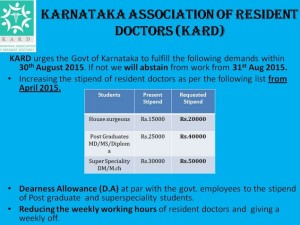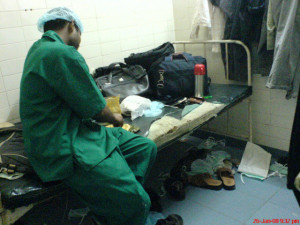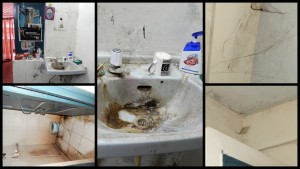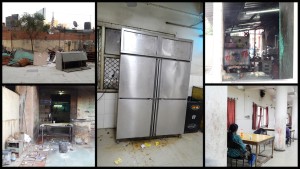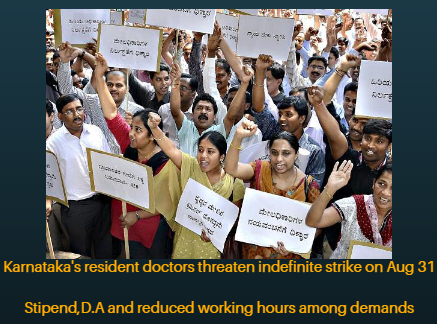
Resident doctors across Karnataka threaten indefinite strike on Aug 31: Stipend,dearance allowance & reduced working hours among demands
Resident doctors working in government medical college hospitals across Karnataka have threatened to go on an indefinite strike from Aug 31 if the government fails to fulfil their continued demands. The major demands are for increased stipends, addressing disparity in dearance allowance, reduced working hours and getting a weekly off.
A member of the Karnataka Association of Resident Doctors (KARD) said that a memorandum had been submitted in this regard to the State government. He was quoted as saying, “If they do not heed our request, we will go ahead with the strike.” Resident doctors have been seeking a hike in stipend since February 2014. Their last stipend hike came in November 2011 and since then doctors in neighbouring states have been taking close to double the stipends Karnataka doctors get. The strike would affect services across government medical colleges. Outpatient services are likely to take a severe hit since resident doctors play an important role here and they are only willing to attend to emergency cases.
While the medical education minister Dr. Sharan Prakash R Patil has confirmed receiving the memorandum from KARD, he said he was unaware of an ultimatum or of doctors abstaining from their services. He has stated that the government would look into the memorandum but advised against the strike. He was quoted by the Bangalore Mirror as saying, “Some doctors met and submitted a memorandum, which is being looked into by the government. An ultimatum can’t be set as to when the government will look into the aspects, which need time to decide and implement”
So why do resident doctors go on strike?
An article in the Indian Medical Times titled “And they are called the backbone of the Indian medical system” showcases the true state of resident doctors who are- on call 24×7, constantly in touch with patients, dealing with 100-200 patients a day , working without breaks for 18-19 hours and having little time for family life or studying. Another major concern is the lack of security in government hospitals where resident doctors constantly get threatened by patients relatives and also need to work night shifts without security. Months of missing or delayed stipends and even less pay which makes resident doctors migrate to higher paying states like Delhi is another reason for doctors to go on strike. The poorly maintained accomodation is another issue doctors have to deal with; which have not been maintained since resident doctors are non-permanent and rotate out of the hospital every 3 years.
According to a report in the Indian Journal of Medical Research in 2013, the fast expansion of medical colleges has resulted in the shortage of medical teachers estimated to be currently 40 per cent. Also, as per the report India plans to open some 200 medical colleges in the next 10 years to meet the projected shortage of 600,000 doctors. On the other hand, an increase in number of hospitals has led to an increase in the number of resident doctors from say 10 to 30, while an investment in infrastructure is not being made. So more doctors with less operating theaters is still inefficient.
The article says, ‘the truth behind strikes’ starts with the wrong impression that it creates i.e. doctors are not working. People try to make doctors feel guilty by saying that they are making people suffer, for this doctors say – put basic amenities in place to allow them to work. Next, most strikes die out because the protesting students (residents) are threatened by their college with non-issual of degree certificate. If solutions are put in to place, they usually last for a month and then go back to square one.In closing, the article talks about how the government can help by standardizing stipends, putting a limit on the doctor patient ratio and providing adequate funds towards infrastructure development as well.
Looking at the demands of the KARD doctors, they are quite similar to those expressed in the India Medical Times article. They are not at all excessive or out of place considering the previous stipend hike was 4 years back and the working conditions at government hospitals do need much improvement. The demands for a D.A, reduced working hours and a weekly off shows that doctors are overworked and underpaid, which should also be addressed. These are very basic demands that if met would keep doctors happy and the government hospitals efficient and functional.
While the government takes its time to decide and implement its plan to match the demands in the memorandum, August 31st and the impending strike looms ahead. More importantly the BBMP elections that start tomorrow (Aug 21st) may see this issue being raised by electoral candidates. In the end, the KARD movement and demands are exemplary and has put the ball in the court of the State government to play very safely. The decision taken by the State government should result in- better pay, work environment and ethical work practices for doctors, to allow them to carry out their duties without any more stress and pressure.
KARD strike reports – Deccan Herald, Bangalore Mirror
Resident Doctors conditions – India Medical Times
Image Credit: Indian Medical Times
